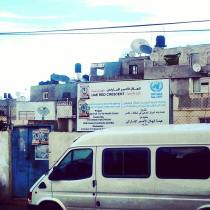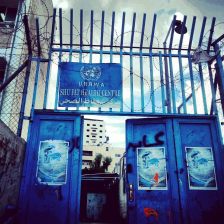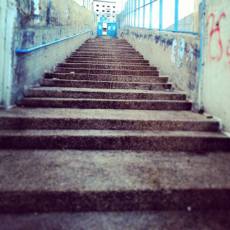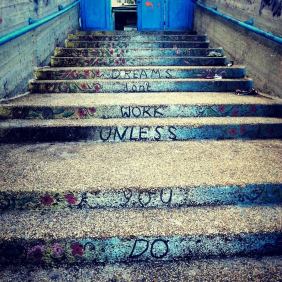This weekend I took the opportunity to visit Shuafat refugee camp, more specifically to the health clinic there. I was in contact with a lady who was a diabetic specialist nurse and worked at the clinic. She showed me around and allowed me to sit in with patients. The clinic had a midwife, phlebotomist, diabetes clinic, pharmacist, bloods lab, and several doctors. It was in many respects a large GP practice. The clinic had been built to treat patience who had sought refuge here after WW2 and the Israeli take-over.
camp, more specifically to the health clinic there. I was in contact with a lady who was a diabetic specialist nurse and worked at the clinic. She showed me around and allowed me to sit in with patients. The clinic had a midwife, phlebotomist, diabetes clinic, pharmacist, bloods lab, and several doctors. It was in many respects a large GP practice. The clinic had been built to treat patience who had sought refuge here after WW2 and the Israeli take-over.
 camp, more specifically to the health clinic there. I was in contact with a lady who was a diabetic specialist nurse and worked at the clinic. She showed me around and allowed me to sit in with patients. The clinic had a midwife, phlebotomist, diabetes clinic, pharmacist, bloods lab, and several doctors. It was in many respects a large GP practice. The clinic had been built to treat patience who had sought refuge here after WW2 and the Israeli take-over.
camp, more specifically to the health clinic there. I was in contact with a lady who was a diabetic specialist nurse and worked at the clinic. She showed me around and allowed me to sit in with patients. The clinic had a midwife, phlebotomist, diabetes clinic, pharmacist, bloods lab, and several doctors. It was in many respects a large GP practice. The clinic had been built to treat patience who had sought refuge here after WW2 and the Israeli take-over.
The refugee camp was associated with three regions and in 1947 it received special and separate treatment from the rest of Palestine and was placed under effective United Nations control. Supported by the Red Cross, many people found safety in its walls but in 1964 refugees from the Muaska Jerusalem camp were forced to relocate to Shuafat. It took away their access to the holy city and their livelihood. Shaufat is now an overcrowded place with a server lack of resources, trying to accommodate for the people from the 48 locations that were taken by Israelis.
control. Supported by the Red Cross, many people found safety in its walls but in 1964 refugees from the Muaska Jerusalem camp were forced to relocate to Shuafat. It took away their access to the holy city and their livelihood. Shaufat is now an overcrowded place with a server lack of resources, trying to accommodate for the people from the 48 locations that were taken by Israelis.
 control. Supported by the Red Cross, many people found safety in its walls but in 1964 refugees from the Muaska Jerusalem camp were forced to relocate to Shuafat. It took away their access to the holy city and their livelihood. Shaufat is now an overcrowded place with a server lack of resources, trying to accommodate for the people from the 48 locations that were taken by Israelis.
control. Supported by the Red Cross, many people found safety in its walls but in 1964 refugees from the Muaska Jerusalem camp were forced to relocate to Shuafat. It took away their access to the holy city and their livelihood. Shaufat is now an overcrowded place with a server lack of resources, trying to accommodate for the people from the 48 locations that were taken by Israelis.
The practice worked on a walk-in basis, no bookings needed. It worked well but made the mornings very busy while the place look dormant in the afternoons. As always, funds were lacking so their medical equipment was old and over-used. Although some old methods are still used worldwide today, they often aren’t as reliable. Things we take for granted in the NHS, is the amount we waste. At home we with chuck things willy-nilly for ‘hygiene’ purposes, which is right however its a luxury and one that is abused. The clinic  didn’t have nearly enough resources and it all relied on things being cleaned properly. This trip demonstrated the different challenges for the wonderful, hardworking nurses there and the ones I see nurses face back home .
didn’t have nearly enough resources and it all relied on things being cleaned properly. This trip demonstrated the different challenges for the wonderful, hardworking nurses there and the ones I see nurses face back home .
 didn’t have nearly enough resources and it all relied on things being cleaned properly. This trip demonstrated the different challenges for the wonderful, hardworking nurses there and the ones I see nurses face back home .
didn’t have nearly enough resources and it all relied on things being cleaned properly. This trip demonstrated the different challenges for the wonderful, hardworking nurses there and the ones I see nurses face back home .
Probably the most challenging thing they faced was it’s temporary relocation. As they’re old building had been bulldozed, waiting on the two year project to rebuild, the center was based on the fist floor of the UN school, located high at the top of a steep staircase. Not practical and showed in their quiet building. The country wasn’t equipped to deal with the disabled or elderly. Thankfully the close family community meant that elderly had a lot of support, even if it wasn’t medical. No, the people with disabilities faced the hardest challenges here with nowhere accommodating for any physical challenges and I scarcely have heard one word about anyone with learning disability.
I am baffled as to where these people are. Just because I have hardly seen anyone obviously recognizably disabled, it certainly doesn’t mean that Arabs have a smaller percentage of vulnerable people. My fear is that the land is so demanding that they rarely venture out or even worse , they don’t feel  connected because of social isolation. This is all speculation but some of the small research I’ve done indicates both as factors. Their lives are a constant battle.
connected because of social isolation. This is all speculation but some of the small research I’ve done indicates both as factors. Their lives are a constant battle.
 connected because of social isolation. This is all speculation but some of the small research I’ve done indicates both as factors. Their lives are a constant battle.
connected because of social isolation. This is all speculation but some of the small research I’ve done indicates both as factors. Their lives are a constant battle.
Unfortunately here in Palestine I haven’t come across any community nursing. Anything that isn’t done in a center is completed by family. Not ideal and far from what you’d hope for people living in such difficult conditions. As for the clinic I can say everyone was lovely, certainly people I would trust with my health.
No comments:
Post a Comment